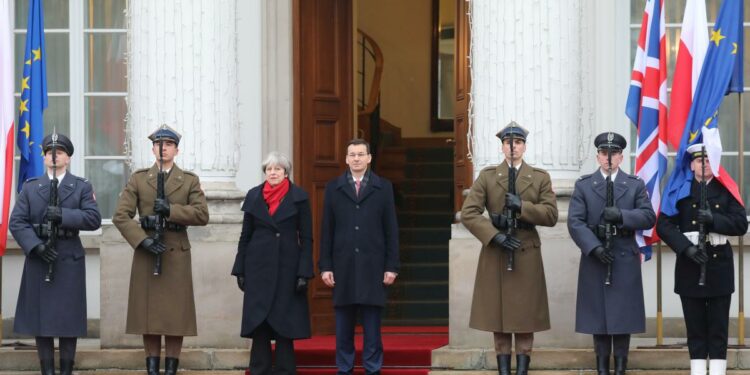Jean-Claude Juncker (R) and Viktor Orban at the European Commission Headquarters in Brussels, October 2015.
Eric Vidal / Reuters
PARTY DOWN
Yet PiS is only nearly, not totally, isolated. Breaking with his EPP allies, Orban has pledged to veto any sanctions against Poland at the critical second stage in the Article 7 procedure, which requires a unanimous vote of EU governments to proceed. (For Orban, solidarity among elected autocrats apparently trumps EPP loyalty.) Thus the EU’s refusal to tackle democratic backsliding and attacks on the rule of law in Hungary—a failure largely traceable to party politics—now renders it incapable of imposing meaningful sanctions on Poland.
Confident that his friends in Budapest will veto any sanctions, Poland’s PiS-affiliated President Andrzej Duda blithely signed into law two of the very bills the Commission objected to—which together would give PiS control over the National Council of the Judiciary and the Supreme Court—just hours after the Article 7 procedure was launched. All indications suggest PiS will plow ahead with its judicial takeover in the months to come, dismissing sitting judges and replacing them with party loyalists, just as Orban has done in Hungary.
Until the EPP is willing to confront its own strongman in Budapest, the EU will remain trapped in this authoritarian equilibrium. EU-level partisan politics follows a kind of inverse Goldilocks principle: not too cold, nor too hot, but just wrong. There are powerful incentives for European parties to protect semi-authoritarian governments who deliver votes to their coalitions. But because the citizens of most countries do not pay attention to EU-level politics, other member parties of these coalitions, such as Merkel’s Christian Democrats in the EPP, pay no political price whatsoever for supporting leaders such as Orban.
The EU, meanwhile, continues to hand over tens of billions of euros in funding to these governments, in essence subsidizing their soft authoritarianism. But thanks to rules about EU-level political parties, allies of the beleaguered opposition parties in Hungary and Poland are legally prohibited from providing any financial or material assistance to them.
By invoking Article 7, the European Commission has taken a major step toward protecting the rule of law in Europe. But to break out of its authoritarian equilibrium, the EU will have to do far more. History, sadly, suggests that state-level authoritarian enclaves can persist for many years in otherwise democratic federations. Before the EU can hope to effectively defend constitutional democracy in Warsaw, center-right leaders such as Merkel, Juncker, and European Council President Donald Tusk will need to put principle above politics and begin to challenge—or at least decide to stop protecting—their ally in Hungary.
For a start, they might expel Fidesz from the EPP, making a clear political statement that the party’s attacks on the independent judiciary, the free press, civil society organizations and the media have no place in the alliance of the democratic center-right. They should also make it clear that in the next multi-annual EU budget, beginning in 2021, EU funding will be tied to respect for democratic values. Finally, they could take the long overdue step of triggering Article 7 against the Orban government as well, a move that could prevent Hungary from vetoing sanctions against the Polish government.
Loading…
Source link : https://www.foreignaffairs.com/articles/hungary/2017-12-22/europes-authoritarian-equilibrium
Author :
Publish date : 2017-12-22 08:00:00
Copyright for syndicated content belongs to the linked Source.



